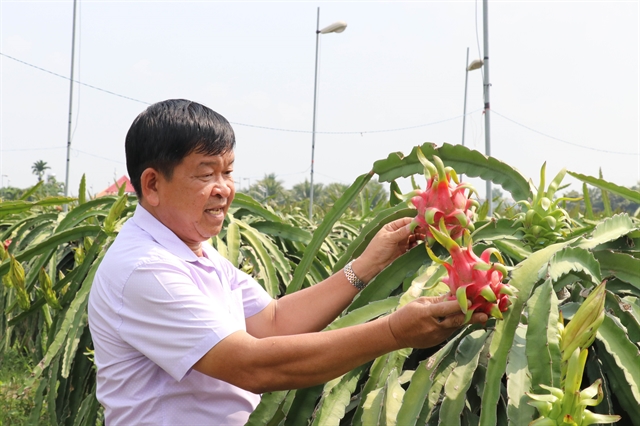 Society
Society

The use of advanced farming techniques to grow dragon fruit in Long An Province, the Cửu Long (Mekong) Delta’s largest producer, has been expanded in the province to ensure steady incomes for farmers.

|
| Dragon fruit grown to VietGAP standards in Long An Province’s Châu Thành District. — VNA/VNS Photo Bùi Giang |
LONG AN — The use of advanced farming techniques to grow dragon fruit in Long An Province, the Cửu Long (Mekong) Delta’s largest producer, has been expanded in the province to ensure steady incomes for farmers.
The techniques include the use of efficient irrigation facilities, using lamps at night to stimulate dragon fruit plants to fruit in the off-season and growing dragon fruit on trellises.
Nguyễn Chí Thiện, deputy director of the province’s Department of Agriculture and Rural Development, said these techniques help reduce costs and improve the quality of the fruits.
Farmers using them earn VNĐ2.5-5 million (US$108-216) more per hectare per year than by practising traditional farming, he said.
Efficient irrigation facilities have helped farmers save 80 per cent of labour costs, including wages paid for irrigating and fertilising their dragon fruit crops, he said.
The province, the country’s second largest producer of the fruit, has 11,800ha under it, including 9,100ha in Châu Thành District, according to the department.
More than 3,460 households in Châu Thành District have been using the advanced techniques on 2,082ha of orchards for the past four years, it said.
A plan to have 2,000ha of land under hi-tech dragon fruit farming in Châu Thành District by 2020 has developed linkages between farmers, co-operatives, co-operative groups, and companies for adopting Vietnamese good agricultural practices (VietGAP) standards.
The Bình Xuyên Hamlet dragon fruit co-operative group in Châu Thành District’s Bình Qưới Commune grows 15ha of the fruit to VietGAP and GlobalGAP standards for export.
The group, which has 34 members, is able to get VNĐ2,000-3,000 per kilogramme more than market prices for its fruits. If the market prices are too low, its members get a minimum of VNĐ10,000 per kilogramme.
Nguyễn Văn Siêm, a representative of the co-operative group, said the members are taught advanced farming techniques.
Recently the price of the fruit declined to VNĐ5,000-6,000 per kilogramme but the group’s members still got the minimum price of VNĐ10,000, he said.
“The group’s yield is also higher than traditional farmers’.”
Võ Thanh Hồng, vice chairman of the Châu Thành District People’s Committee, said the district plans to use advanced techniques on 67 per cent of its total dragon fruit farming area by 2025.
It has encouraged farmers to participate in co-operatives and co-operative groups to produce quality fruits and to ensure they have guaranteed outlets, he added. — VNS




